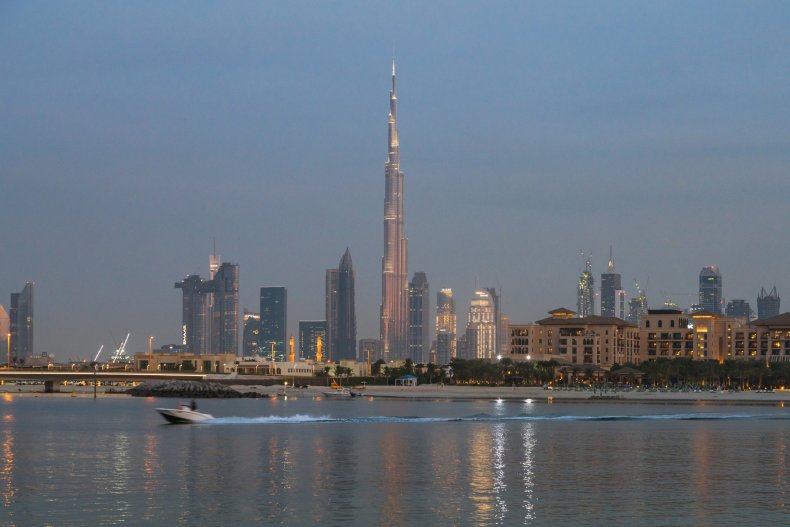[ad_1]
Israel now has a peace plane. The plane is an El Al Boeing 737 and is named for the Israeli city of Kiryat Gat. It has become renowned for being the first Israeli plane to fly to Morocco on December 22, as Israel normalized relations with Rabat, and also the first to go to the United Arab Emirates (UAE) in late August. The presence of an El Al airplane in capital cities around the Middle East is unprecedented—just as seeing Israeli flags proliferate across Morocco, the UAE and Bahrain has seemed like something from a parallel universe, in which all the pervasive acrimony against Israel doesn’t exist.
The new era of peace deals has already illustrated just how much hunger there was on both sides for these agreements. An estimated 50,000 Israelis flew to Dubai after flights began on November 26. I was one of the people who flew from Tel Aviv to Dubai on a packed Fly Dubai flight this month, and it was striking how normal it felt. This normality is natural, because Dubai is a city with hundreds of nationalities, hosting people from all over the world. Hanukkah celebrations below the Burj Khalifa skyscraper this month showcased how Jewish holidays can, and should, be celebrated all across the Middle East
However, a concerted campaign over the decades attempted to make it seem acceptable that not only would Israel lack relations with dozens of mostly Muslim countries, but Jewish religious displays themselves would be considered taboo or “controversial” in those places. This clear link between making the Jews feel unwelcome and not having relations with Israel illustrates how much of the anti-Israel crusade of the last 70 years has simply been an anti-Semitic policy. For example, reports now indicate Morocco will teach Jewish history in schools. That is a positive change. However, it is also extraordinary that Jewish history was not already being taught in a land where Jews have such a long history. How is that possible? Why was it acceptable?

Rustam Azmi/Getty Images
Acceptance of the isolation of Israel and erasure of Jewish history in the Middle East has been an open wound afflicting the whole region. It should never have happened. Israel and some Arab countries fought a war in 1948, and there are legitimate reasons that Palestinians and their supporters opposed Israel’s policies. But similar terrible wars, such as that between India and Pakistan in 1948, didn’t result in dozens of countries not recognizing India or pretending that Hindus don’t exist. Normalization and the presence diplomatic relations are the most basic geopolitical norms throughout the world. Yet so many politicians, like former U.S. Secretary of State John Kerry, who pushed for engagement with Iran, blindly accepted the fact that so many countries did not normalize ties with Israel.
The whole nature of the conversation about Israel over the last decades has been tainted by accepting as normal a situation that was inherently abnormal. It became normal in Western universities to debate the very existence of Israel, and to advocate for a “one-state” solution without even consulting the eight million people in Israel and millions of Palestinians. In no other instance in the world do American college students blithely decide that they will erase countries and shoehorn them into new “one-state” solutions, like recreating Yugoslavia or Czechoslovakia without first asking people in Slovakia and Kosovo. Only when it comes to Israel was it taken for granted that people will debate its very existence itself. This semi-genocidal debate, like the erasure of Jewish history in countries like Iraq, places from which the Talmud was created, is a brutal assault on both history and international norms.
Now, long years of this abuse are being corrected with the new era of relations between Israel, Morocco, the UAE, Bahrain and Sudan. The usual predictions of doom and gloom have not come true. Israelis can be safe in these countries. Instead of the ingrained anti-Semitism and way in which Jewish holidays have been made to seem controversial if celebrated in most countries across the region, we now see how countries are embracing Jewish culture and history. The Crossroad of Civilizations Museum in Dubai, for instance, now has brochures in Hebrew. Kosher food is now offered at the Ritz-Carlton in Manama. These are symbolic changes that speak volumes about a new normal that is banishing the intolerance of the past. It feels like a revolution is happening in the Middle East.
Seth J. Frantzman is executive director of the Middle East Center for Reporting and Analysis, a senior analyst of Middle East affairs for The Jerusalem Post and author of After ISIS: America, Iran and the Struggle for the Middle East (2019). Twitter: @sfrantzman.
The views expressed in this article are the writer’s own.
[ad_2]
Source link